新人教必修五 UNIT4 MAKING THE NEWS[教案]
高中英语新人教必修五 Unit4 Making the news单元教案
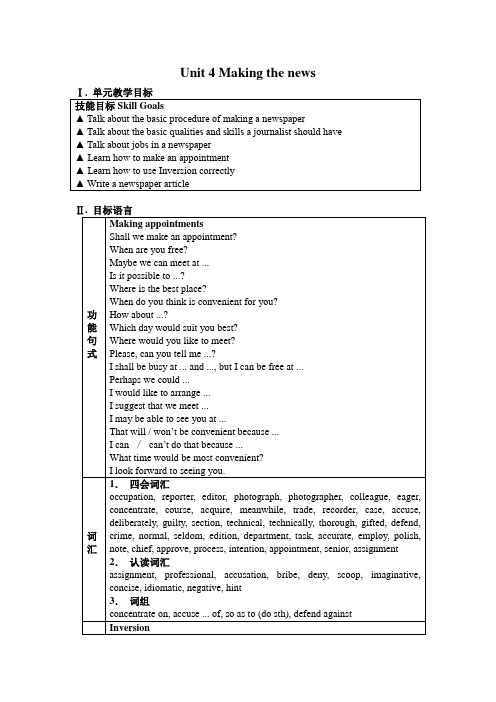
Unit 4 Making the newsⅢ. 教材分析与教材重组1. 教材分析本单元的中心话题是“新闻”,内容涉及新闻工作者应该具备的素质和新闻采访的基本程序等。
语言技能和语言知识主要围绕“新闻”这一中心话题进行设计。
1.1 Warming Up 通过讨论引出报社工作人员的类别和职责。
1.2 Pre-reading首先通过一个调查问卷引导学生了解一个优秀的记者应该具备的素质;然后引导学生谈论他们的“第一次”经历和感受;最后通过一个“假设”为下一部分的学习做好准备。
1.3 Reading通过Zhou Yang,一名的新员工和他的上司Hu Xin,一位资深记者之间的谈话引导学生了解新闻工作者应该具备的素质,新闻采访的基本程序以及采访时应该注意的要点等。
1.4 Comprehending设计了四个教学活动来加深学生对Reading部分的理解。
Ex. 1要求学生根据要求,阅读文章,获取所需信息;Ex. 2要求学生把阅读部分分成三个小节,并说明每小节的要点;Ex. 3通过形容词归类进一步引导学生思考一个优秀的文字记者和摄影记者应该具备的素质。
1.5 Learning about Language部分归纳和运用了本单元的一些重点词汇和语法。
1.6 Using Language部分涵盖了听、说、读、写四项语言基本技能。
首先通过阅读GETTING THE “SCOOP”一文,介绍“新闻”写作的步骤和见报前的有关程序,并讨论文中这位“影星”可能说了什么谎话,在阅读和讨论的基础上写出一条有关某“影星”的独家新闻;然后要求学生听一段对篮球明星姚明的采访录音,做听力练习;最后要求学生通过两人对话复习巩固有关交际功能“约会”的用语。
1.7 SUMMING UP部分归纳了本单元的主要学习内容并让学生自我检测一下学习效果。
1.8 LEARNING TIP部分建议学生尽可能多地阅读一些适合中学生的英文报纸。
2. 教材重组2.1 将Warming Up, Pre-reading, Reading与Comprehending整合成一节“精读课”。
人教版高中英语必修5教案Unit 4 Making the news

人教版高中英语必修5教案Unit 4 Making the news Unit 4 aing the nes一教学目标(Teahing ais)1 能力目标(Abilit ai)Enable the Ss t regnize the variet f bs there are in nespapers and hat is needed t r in a nespaper ffieEnable the Ss t n hat is needed t bee a reprter and h t ndut an intervie2 语言目标(Language ai)重点词汇和短语upatin, update, subit, ver, nentrate n, infr, publish, plish, apprve, aquire, ause…f, s as t, sp, deadline, depend n, ahead f, assess, deand, press重点句子1) Never ill Zhu ang frget his first assignent at the ffie f a ppular Englishnespaper2) u’ll find ur lleagues ver eager t assist u, s u a be able t nentrate n phtgraph later if u’re interested3) Nt nl a I interested in phtgraph, but I t an aateur urse at universit t update sills4) nl if u as an questins ill u aquire all the infratin u need t n) e sa a gd urnalist ust have a gd “nse” fr a str6) eanhile u have t prepare the next questin depending n hat the persn sas7) Have u ever had a ase here sebd aused ur reprters f getting the rng endf the sti?8) Perhaps I t ill get a sp!Aids: ultiedia failities, tape-rerder, phts, diagras二教学重难点(Teahing iprtant pints)n hat is needed t bee a reprter and h t ndut an intervie aster the use f inversin三教学方法(Teahing ethd)Fast reading; Tas-based ethd ≈ disussin四教学步骤(Teahing predure)Perid IStep I aring up ( see page 2 )an u tell se bs in a nespaper pan? hat are their bs invlves?Tpes f bshat it invlvesReprter/ urnalistIntervie peple r finds ut events fr nlers PhtgrapherTaes phts f iprtant peple r eventsEditraes sure the riting is lear, nise and aurate, he fats DesignerLas ut the artiles and phtgraphsPrinterPrints the nespaperTeahing suggestins: rearrange the rder f the tpes f bs a nespaper has and hat the invlveAnd as the students t d the athes Then as the t p hat’s n the sreen t their bsAt the sae tie deal ith the ne rds:upatin and urnalist and the expressin: suppse u ere…upatin =a b r prfessinTeahing is upatin 教书是我的职业。
人教新课标高中英语必修五Unit+4+Making+the+news+教案.doc
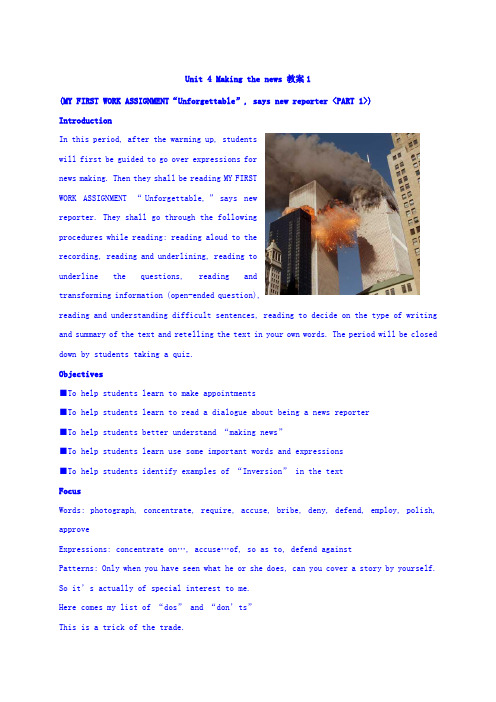
Unit 4 Making the news 教案1(MY FIRST WORK ASSIGNMENT“Unforgettable”, says new reporter <PART 1>)IntroductionIn this period, after the warming up, studentswill first be guided to go over expressions fornews making. Then they shall be reading MY FIRSTWORK ASSIGNMENT “Unforgettable,”says newreporter. They shall go through the followingprocedures while reading: reading aloud to therecording, reading and underlining, reading tounderline the questions, reading andtransforming information (open-ended question),reading and understanding difficult sentences, reading to decide on the type of writing and summary of the text and retelling the text in your own words. The period will be closed down by students taking a quiz.Objectives■To help students learn to make appointments■To help students learn to read a dialogue about being a news reporter■To help students better understand “making news”■To help students learn use some important words and expressions■To help students identify examples of “Inversion” in the textFocusWords: photograph, concentrate, require, accuse, bribe, deny, defend, employ, polish, approveExpressions: concentrate on…, accuse…of, so as to, defend againstPatterns: Only when you have seen what he or she does, can you cover a story by yourself. So it’s actually of special interest to me.Here comes my list of “dos” and “don’ts”This is a trick of the trade.This is how the story goes.Later we were proved right.AidsMultimedia facilities, tape-recorder, photos, diagramsProcedures1. Warming up⑴ Warming up by discussingThink like a reporterHi, everyone. Today we will learn something about making the news. Suppose you work for China Daily, what types of jobs do you choose? What does it involve? Now in pairs discuss them. Give reasons for your choice.Types of jobs: What it involvesReporter Interviews people or finds out about events from onlookersPhotographer Takes photographs of important people or eventsEditor Makes sure the writing is clear, concise and accurate; checks factsDesigner Lays out the article and photographsPrinter Prints the newspaperWell done! By the way, have you ever heard “journalist”? Is there any difference between journalist and reporter? Ordinarily speaking, a reporter is a person whose job is to discover information about news events and describe them for a newspaper or magazine or for radio or television. And a journalist is a person who writes news stories or articles for a newspaper or magazine or broadcasts them on radio or television. Maybe in Chinese we can understand it better: reporter; journalistreporter=news reporter“新闻记者”,特指外出采访的记者。
人教新课标高中英语必修五Unit 4 Making the newsUnit 4 Making the news教案(7)
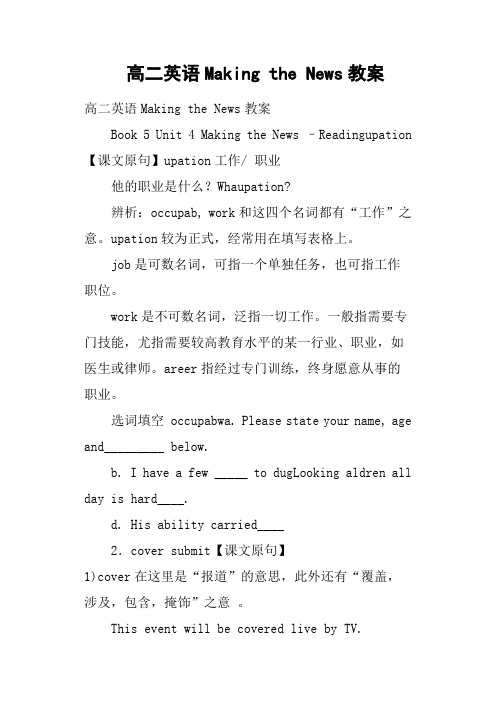
高二英语Making the News教案高二英语Making the News教案Book 5 Unit 4 Making the News –Readingupation 【课文原句】upation工作/ 职业他的职业是什么?Whaupation?辨析:occupab, work和这四个名词都有“工作”之意。
upation较为正式,经常用在填写表格上。
job是可数名词,可指一个单独任务,也可指工作职位。
work是不可数名词,泛指一切工作。
一般指需要专门技能,尤指需要较高教育水平的某一行业、职业,如医生或律师。
areer指经过专门训练,终身愿意从事的职业。
选词填空 occupabwa. Please state your name, age and_________ below.b. I have a few _____ to dugLooking aldren all day is hard____.d. His ability carried____2.cover submit【课文原句】1)cover在这里是“报道”的意思,此外还有“覆盖,涉及,包含,掩饰”之意。
This event will be covered live by TV.Dver a mistaary covered her face wandlaughed to cover her anxHis reading covers a wide range of subWe covered about 30 miles a da2)submit v. 提交,呈递(文件等);使服从,顺从常见搭配:sub(to sb).(向某人)提交某物submit(oneself)to 听任①请提交你的申请表。
Please submit your applica②我不肯听任他的控制。
I refuse tosubmit(myself)lassist ate课文原句】1) assist v. 帮助,协助常见搭配:assist (sb)with/in sth.帮助(某人)做某事assist sb to do sth 帮助某人做某事 assist (sb) in doing sth帮助(某人)做某事①他叫我来帮助他实施他的计划。
人教版高中英语必修5《Unit4Makingthenews》教案

人教版高中英语必修5《Unit4Makingthenews》教案人教版高中英语必修5《Unit 4 Making the news》教案【一】教学准备教学目标Objectives:1. Instructional objectivesBy the end of the class, most students are able to:1) Use the words and the phrases they learned to complete the tasks based on the text.2) Pronounce correctly the new words (especially “carnival” )by themselves and with the help of the teacher.3) More than half of the students can speak fluently and accurately about their views towards carnival in pairs with the teacher’s scaffolding.2. Educational objectivesBy the end of the class, students are able to:Improve their cultural awareness from carnival and learn more about its influence on the western culture after class3. Personal objectives:1) Be confident of standing on the stage and speak clearly and spontaneously.2) Encourage students to speak in the class with different kind of techniques.教学重难点Focal points:By the end of the class, students are able to:1) Improve the main reading skills through completing reading tasks in pair work and group work.2) Use the table to finish their essay about their favorite film.Difficult points:By the end of the class, students are able to:1) speak fluently and accurately about their favorite films in pairs with the teacher’s scaffolding.2) Write a film review according to the table and the text.教学过程Procedures and time allotmentStage 1 Getting students ready for learningT: Class begins!Ss:…T: Good afternoon, class!Ss:…T: Today, let’s come to Culture Corner. Module 4. Do you know Chinese festivals?Ss:…T: First, Work in groups, discuss and make a list of Chinese festivals in English. (1min).Ss:…T: OK, time is up. You know Chinese festivals?Ss:…T: very good. For example1.New Year’s Day 元旦节 (1月1日)2. Spring Festival 春节 (农历正月初一)3. Lantern Festival 元宵节 (农历正月15)4. the Qingming Festival 清明节 (4月5日)5. Dragon Boat Festival 端午节 (农历5月初五6. Double-ninth Day 重阳节 (农历9月初九)7.National Day 国庆节 (10月1日)T: And festivals brought us much traditional knowledge. So, festival is beautiful. Do you know foreign festivals?Ss:...T: In the textbook, there are some festivals with pictures. Do you know the right descriptions about them?Ss:...T: This festival is at the end of Octo ber, when “ghosts” come out.Ss:...T: This is when Americans remember the hard times when they first arrived in the country.Ss:..T: This is a festival of color, which marks the beginning of spring in India.Ss:...T: This is a Christian festival which comes in the middle of winterSs:...T: Let’s watch a video. Can you guess what festival it is? .T: They are dressed up in special clothes, and they are wear masks.Ss:...T: now, First question is how do people feel on this festival? Second is what festival is it?Ss:...T: Yes, very good. Now, let’s watch a video about Carnival.Ss:...T: what do you remember about carnival?Ss:...T: Where did it first?Ss:...Stage 2 Pre-readingStep 1. Listen to the tape.T: Let's listen to the following passage to learn more about carnival. Try to find out what places are mentioned in terms of carnival celebrations.Ss:..T:...Step 2. Scan the passage and try to answer the questions.T: What is the meaning of carnival?Ss:...T: Originally it meant “with no meat”bu t now it symbolizes “life”.Step 3. Read the passage and match column A with column B.T: OK, now I will give you 1 minute to read it again and then I will ask you someStage 3 While-readingStep 1 Read the passage. Choose the best answers to the two sentences.T: are you finish? Let’s look at the questions.first question is Today Carnival has become a celebration of ____. Which one you choose?A. freedomB. harvestC. life itselfD. successSs:...T: YES, very good. Next question is We need to _____ to understand what carnival is all about.A. look at the history of AmericaB. go to AmericaC. look at the meeting of two cultures---European and AfricanD. Both A and CSs:...T:....Step 2 check whether the statements are true or false.T: …T: Now, let’s ch eck.With the opening of huge farms and plantations, many Africans went to look for jobs in America., what’s your idea?Ss:…T: Do you agree?Ss:…T: Excellent, in paragraph 2, this marked the beginning of the slave trade. So the question 1 is False.T: next question 2, The Europeans imported their festivals and later the slaves learned from them and added their traditions.Ss:...T: very good. This answer in paragraph 3.Ss:...T: question 3,The slave trade was abolished and the salves took over the carnival.Ss:...T: the last, With the passing of time, carnival became a festival of the black people only.Ss:…T:Exactly! Superb!Step 3 Skimming for specific informationTask: Answer the questions according to the passage.T: Read the text carefully and answer the questions.Next, we will read the text again to explore how the text organized. 3minutes, Let’s go!T: Now, let’s check your answers. What is carnival today?Ss:Carnival today is an international, multicultural experience.T:The second question is Where were the slaves taken from ?Ss:In AfricaT:....T: Excellent!Stage5 Post-readingDiscussion: Useful questions to make up dialoguesT: there have seven questions, useful questions to make up dialogues.Have you dressed up in special clothes?2 What did you wear?3 How did you feel?4 Did you eat special food?5 Did you give or receive gifts?6 Did you have a holiday from school?7 Did you enjoy yourself with your family or friends?T: I will divide the class into 3 students in a group. 3 minutes, 1, 2, begin!Ss:...T:Time is up. which one do you choose?Ss:....T: Yes, so the theme of Frankenstein is about science and humanity.T: OK, next group, do you have other answer?Ss:...课后习题homeworkDo exercises on Page 37-38.人教版高中英语必修5《Unit 4 Making the news》教案【二】Period 1&2 warming up and readingTeaching Aims:1.Enable the students to talk about the qualities needed to be a good reporter and how to conduct a good interview2. Enable the students to learn some reading strategies3. Enable the students to learn the necessary qualities in their future jobImportant Points and difficult pointsLearn about how to be a good reporterTeaching methodsStrategic reading method; Task-based methodTeaching procedures:I. Elaboration (warming up): Help the students to relate their known knowledge to the topic that will be learnedTask 1 :( group discussion) Talk about jobs in China Daily?Types of jobs What it involvesreporterTask2: Predict what is going to be learned by looking at the title of the text. Which type of job will be talked about in the text?II. Prediction (pre-reading):Task 3: Predict the main idea of the text by discussing the following questions:1. What are the qualities a good news reporter needs to have?(Have group discussion first and then finish Part 1 individually)2. What your first day at school was like? How would you feel on your first day at work? (Group discussion)III. Skimming, scanning, analyzing (Reading & Comprehending)Task 4: Read the text quickly to get a general idea of the text.Task 5: Divide the passage into three sections and match the following main ideas to the three sections:How to get an accurate storyHow to protect a story from accusationsHow to become a reporterThe skills neededThe importance of listeningStages in researching a storyHow to check factsHow to deal with accusations of printing liesWork in a teamTask 6 Read quickly to find out the information to fill in the form belowTask 7: Tell what is required for a reporter and a photographerpatient; imaginative ; well-organized; technically good; polite; concise; thorough; creative; curious; careful; gifted; professionalA reporter A photographerIV. SummarizingTask 8: Write a summary of the textV. AssignmentRead an English newspaper and retell the main idea of one article in it.Period 3&4 Words & ExpressionsTeaching Aims:Get the students to know how to use some words and expressions correctly and appropriatelyImportant Points and difficult pointsUse some words and expressions correctly and appropriately Teaching methodsDemonstrating and summarizing; practicingTeaching procedures:1. occupation n.1). Teaching is my occupation. 职业2). Swimming is my occupation. 使…忙碌的事情;消遣occupy v.occupied=busyoccupy oneself in/with sth.employment; occupation; job; profession; vocation; work; tradeHe is looking around for .: artistHe is out of .She chose teaching as her .She’s a lawyer by .He’s a carpenter by .2. assign v.assignment n.She gladly accepted the assignment. (分派的任务;工作)The English assignment is a book report. (课外作业,功课)3. on one’s ownof one’s ownfor one’s ownWe should complete the test _________4. experienced adj.be experienced in/at sth/doing sth.Who is experienced in cooking in your home?5. The first/last time + 时间状语从句The first time I came here, I was not used to the climate here.Cover n. 封面,掩盖(物) ;v.1). Tom will covered the outbreak of the disease.2). The road was covered with snow.3). She laughed to cover her worry.4). The red army covered about 30 miles a day.5). Is the money enough to cover the cost of a new shirt?7. Be eager for sth. (sucess)to do sth.that clauseHe is eager to see his daughter.We are eager that the project should be started earlybe anxious about =be worried about8. Concentrate on sth./doing sth.We should concentrate on our study.Tom is concentrating on fishing.9. of +抽象名词(importance; value; use; help; benefit)of special interest=of no use=The meeting is of great importance.=Each minute is _____ for us.of greatly valuablegreat valuableof great valuefor much value10. acquire; get; gain1). I sat in the front of the bus to ___ _ a good view of the countryside.2). Gradually we _______ experience in how to do the work.3). They _____the victory after a bloody battle.11. have a nose for 嗅觉灵敏She has an ear for music. 有鉴赏能力She has an eye for color and style in clothes. 有眼光12. Meanwhile=in the meanwhile=in the meantime=at the same timeMother went shopping; meanwhile, I cleaned the house13. trade n. v.1). Japan does lots of trade with the United States.2). He is a shoemaker by trade.3). She trades 3 apples for some bananas.14. Trick1). 窍门,手法2). play a trick(joke)on sb.=make fun of sb. (玩笑,恶作剧)3). He got into the building by a trick (诡计,花招)15. Challenge1).He challenge my view on that matter.2).To finish the job in 2 days was a real challenge.16. Supportn. 1).I need your support.v. 1)为…提供证据,证实2) The old man entered the room supported by his grandson.3). He has always supported the weaker party.4). He has a large family to support.17. Case1).He thought he had solved the problem , but that was not the case.2).Here is a case of being careless.3).We will look into that case.in case of sth. 如果,万一…in that/this case 在那样/这样情况下in no case 决不in case + 从句以防;可能;倘若Take an umbrella in case it rains.(in case 从句常用一般现在时表将来, 或should+do)17. accuse sb. of sth.=charge sb. with sth.Tom ____ his boss of having broken his word.blamedaccusedchargedscolded18. so as to do sth. 只能在句末= in order to do sth.=so that + 从句= in order that + 从句I got up at five so as to catch the train=19. admitadmit doing /having doneadmit sb. Into/to (the university)Lily finally admitted___ my umbrella by mistake.to taketo have takenhaving takenhave taken20. n. adj.profession professional 具有….特点Finish Ex 3 on Page 29AssignmentFinish Ex1 and Ex 2 on Page 28 and Ex 3 on Page 29 (Discovering useful words and expressions)Finish Ex 2 , Ex3 on Page 63 and Ex4 on Page 64 (Using wordsand expressions) in Workbook.Period 5 GrammarTeaching Aims:Get the students to use “Inversion” correctly and appropriatelyImportant Points and difficult pointsUse “Inversion” correctly and appropriatelyTeaching methodsTask-based method; Demonstrating; discussion; summarizing; practicingTeaching procedures:I. PresentationTask 1: Comprehend the following sentencesOnly then did I begin my work on designing a new bridge.=I began my work on designing a new bridge only then.2. Not only was there a Christmas tree, but also exciting presents under it.=There was not only a Christmas tree, but also exciting presents under it.Inversion: 起强调作用II. Analyzing & summarizingTask 2: Find 4 examples of inversion in the reading passage1. Never will Zhou Yang forget his first assignment at the office of China Daily.2. Only when you have seen what he or she does, can you cover a story by yourself.3. Not only am I interested in photography, but I took a course at university.4. Only if you ask many different questions will you acquire all the information you need to knowTask 3: Analyze the sentences above and summarize the rules1. Why can these sentences use inversion ?2. How are these inverted sentences made?※ 否定副词no;not;hardly, little, seldom, never, no sooner…than, no more, not only, only 等开头的句子要部分倒装。
高中英语 Unit4 Making the news教案 新人教版必修5

英语必修5人教版新课标Unit 4第1课时教案Unit 4 Making the news教材分析I.教学内容分析本单元的中心话题是“新闻”,内容涉及新闻工作者应该具备的素质和新闻采访的基本程序等。
语言技能和语言知识主要围绕“新闻”这一中心话题进行设计的。
Warming up部分通过讨论来引出报社各工作人员的工作类别和所负的责任。
关键在于What’s the job?和 What it involves?Pre-reading部分首先通过一个调查问卷来引导学生去考虑一个优秀的记者应该具备的素质;然后引导学生谈他们难忘的经历和感受;最后通过一个“假设”为下一部分的学习做好准备。
Reading部分通过Zhou Yang,一个跃跃欲试的新手和他的上司Hu Xin, 一个经验丰富的资深记者之间的谈话引导学生了解新闻工作者应该具备的素质,新闻采访的基本程序及采访时应该注意的要点等。
Comprehending设计了四个教学活动来加深学生对“阅读”(Comprehending)部分的理解和复习。
第一个活动要求学生根据要求,通过阅读找到所需要的信息,重新组织后再呈现出来。
第二个活动要求学生把阅读部分分成三个小节,并说明每个小节的要点。
第三个活动通过形容词归类进一步去引导学生思考一个优秀的文字记者和摄影记者应该具备的素质。
第四个活动要求学生朗读后半部分对话,练习句子重音和语调。
Learning about language 归纳和运用了本单元的一些重点词汇和语法。
Using language部分涵盖了听,说,读,写四项语言基本技能。
第一部分学生首先通过阅读“获得‘独家新闻’”一文。
写出“新闻”报道的步骤和见报前的有关程序,然后讨论这位“影星”可能说了什么谎话。
第二部分首先听一段对篮球明星姚明的采访。
随后的练习设计既训练了学生获取要点的能力,又引导学生如何获取细节。
最后要求学生通过开展两人对话活动复习巩固有关交际功能“约会”的用语。
新人教版必修五 Unit 4 Making the news[教案]Period3
![新人教版必修五 Unit 4 Making the news[教案]Period3](https://img.taocdn.com/s3/m/9cfb1d848762caaedd33d473.png)
Unit 4 Making the newsPart 1 Teaching Design第一部分教学设计Period 3 A sample lesson plan for Using Language(Getting the scoop)IntroductionLanguage is learned to be used in and for communication. So in this period we shall have the students, after warming up by summing up how a newspaper is made, read and translate a passage entitled Getting the scoop, do exercises and listen. The teaching ends by students acting a text play ObjectivesTo help students read the passage “Getting the scoop on page 30To help students use the language by listening, speaking and writing as wellProcedures1. Warming up by summing up how a newspaper is madeTo begin with let us sum up what we have learned about news making.The chief editor holds a meeting→journalists interviews people and write sotries→photographers takes photographs→photographs are quickly developed→editors check the reports→editors writes the headlines→the newspapers are printed→the news are delivered by train and truck.2. Reading and translatingRead the text Getting The Scoop and translate it into Chinese paragraph by paragraph. …Y ou are to do paragraph 1, please, Xiao Li.3.Reading and underliningNext you are to read and underline all the useful expressions or collocations in the passage. Copy them in your notebook after class as homework.4. Doing exercisesNow you are going to do Ex. 1 and 2 on page 31 following the article.5. ListeningFor listening turn to page 31 and be ready to do Ex. 1 and 2.6. ActingNext we are going to practice making appointments in pairs.7. Closing down by acting a text playTurn the article My First Work Assignment into a text play. Choose your part and rehearse for the School Art Festival next month.。
人教英语必修五Unit4Makingthenews教案14
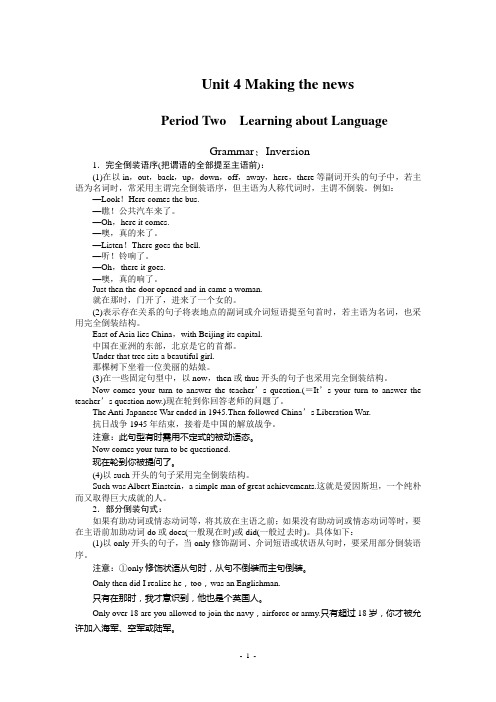
Unit 4 Making the newsPeriod Two Learning about LanguageGrammar:Inversion1.完全倒装语序(把谓语的全部提至主语前):(1)在以in,out,back,up,down,off,away,here,there等副词开头的句子中,若主语为名词时,常采用主谓完全倒装语序,但主语为人称代词时,主谓不倒装。
例如:—Look!Here comes the bus.—瞧!公共汽车来了。
—Oh,here it comes.—噢,真的来了。
—Listen!There goes the bell.—听!铃响了。
—Oh,there it goes.—噢,真的响了。
Just then the door opened and in came a woman.就在那时,门开了,进来了一个女的。
(2)表示存在关系的句子将表地点的副词或介词短语提至句首时,若主语为名词,也采用完全倒装结构。
East of Asia lies China,with Beijing its capital.中国在亚洲的东部,北京是它的首都。
Under that tree sits a beautiful girl.那棵树下坐着一位美丽的姑娘。
(3)在一些固定句型中,以now,then或thus开头的句子也采用完全倒装结构。
Now comes your turn to answer the teacher’s question.(=It’s your turn to answer the teacher’s question now.)现在轮到你回答老师的问题了。
The Anti-Japanese War ended in 1945.Then followed China’s Liberation War.抗日战争1945年结束,接着是中国的解放战争。
注意:此句型有时需用不定式的被动语态。
高中英语新人教版精品教案《Book 5 Unit 4 Making the news》
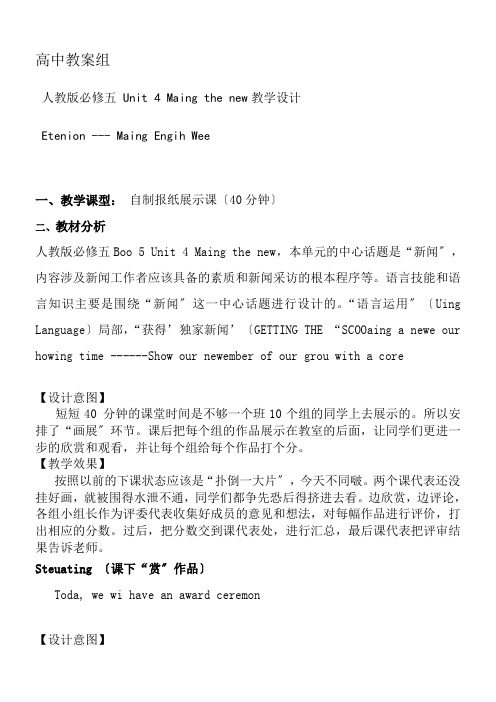
高中教案组人教版必修五 Unit 4 Maing the new教学设计Etenion --- Maing Engih Wee一、教学课型:自制报纸展示课〔40分钟〕二、教材分析人教版必修五Boo 5 Unit 4 Maing the new,本单元的中心话题是“新闻〞,内容涉及新闻工作者应该具备的素质和新闻采访的根本程序等。
语言技能和语言知识主要是围绕“新闻〞这一中心话题进行设计的。
“语言运用〞〔Uing Language〕局部,“获得’独家新闻’〔GETTING THE “SCOOaing a newe our howing time ------Show our newember of our grou with a core【设计意图】短短40 分钟的课堂时间是不够一个班10个组的同学上去展示的。
所以安排了“画展〞环节。
课后把每个组的作品展示在教室的后面,让同学们更进一步的欣赏和观看,并让每个组给每个作品打个分。
【教学效果】按照以前的下课状态应该是“扑倒一大片〞,今天不同啵。
两个课代表还没挂好画,就被围得水泄不通,同学们都争先恐后得挤进去看。
边欣赏,边评论,各组小组长作为评委代表收集好成员的意见和想法,对每幅作品进行评价,打出相应的分数。
过后,把分数交到课代表处,进行汇总,最后课代表把评审结果告诉老师。
Steuating 〔课下“赏〞作品〕Toda, we wi have an award ceremon【设计意图】按照“人人参与,人人有奖〞的原那么,评出“最正确创意奖〞、“最正确原创奖〞、“最正确设计奖〞、“最正确书法奖〞、“最正确合作团队〞、“最正确新闻奖〞、“最具人气奖〞等等。
让每个付出努力的小组都能获得相应的奖项,表达人文关心。
如此,他们的干劲就更大了!【教学效果】笔者还专门集中一个时间举行了一次颁奖典礼------精心打印好每个组的荣誉证书,并配上相应的奖品,还让语文课代表为每个小组写上“颁奖词〞,并由“著名主持人〞------ 班上一名校园播送站的同学宣读颁奖词,由“评委〞------ 课代表和英语老师一起为获奖者颁奖,最后是获奖者发表“获奖感言〞。
人教新课标高中英语必修五Unit 4 Making the newsUnit 4 Making the news教案(1)
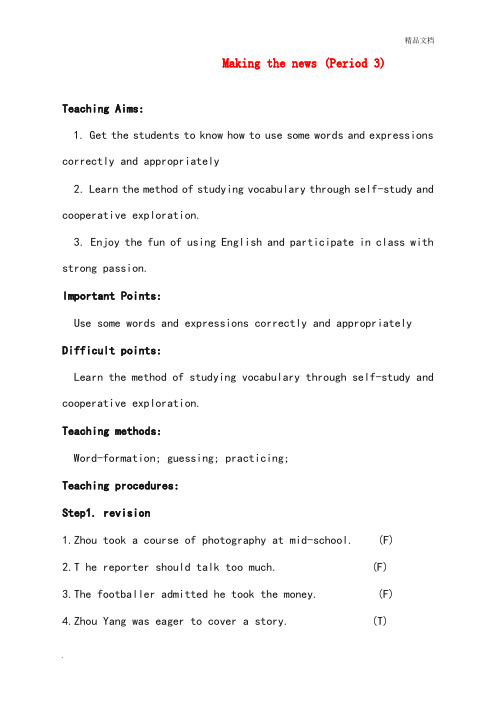
Making the news (Period 3)Teaching Aims:1. Get the students to know how to use some words and expressions correctly and appropriately2. Learn the method of studying vocabulary through self-study and cooperative exploration.3. Enjoy the fun of using English and participate in class with strong passion.Important Points:Use some words and expressions correctly and appropriately Difficult points:Learn the method of studying vocabulary through self-study and cooperative exploration.Teaching methods:Word-formation; guessing; practicing;Teaching procedures:Step1. revision1.Zhou took a course of photography at mid-school. (F)2.T he reporter should talk too much. (F)3.The footballer admitted he took the money. (F)4.Zhou Yang was eager to cover a story. (T)Step2. vocabulary studyingkey words : getting the new word1. delight n. 快乐delight + ed = delight adj. 快乐的,欣喜的e.g. (1)To our _______, our football team won.(2)The students will be _________ to act as a farmer.2. admire v. 钦佩admire + able = admirable adj. 令人钦佩的e.g. (1)I _______ their hard-working spirit.(2)His bravery is_______.3. assist v. 帮助assist + ant = assistant n. 助手e.g. At school, I often ________ our monitor to close the window in the classroom. She is a good ________ of our headteacher(班主任).4. profession n. 专业profession + al = proffessional adj. 专业的e.g. (1)His ________ is physics.(2)They are ________ teachers and can help you do the exercise.Task 2 phrases learning1. Guessing meaning of these phrases using the examples ang Englishexplaination(1) be eager to do sth 渴望做某事English meaning: want to do sth very much.e.g. He is eager to find a job to make a living.(2) depend on 依赖opposites(反义词): do sth yourselfe.g. As an adult, we shouldn’t depend on our parents any more.(3) concentrate on (doing) sth 集中精力(做)某事synonyms(同义词):focus on sth ;be absorbed in sthe.g. You should only concentrate on looking for it.(4) inform sb of (doing)sth 通知某人某事English meaning: tell sb about sth to make them knowe.g. You must inform him of finishing it as soon as he can.(5) accuse sb of doing sth 因某事控告或责备某人English meaning: blame sb for doing sth wronge.g.People accused the leader of taking money from the businessman.(6) so as to do sth 为了干……Synonyms(同义词):in order to do sth.不能放在句首e.g. She decides to study hard so as to go to the university2. Finishing the following exercise(1)You should inform us of _____there early.A. getB.gettingC. to getD. got(2) These people________(依靠) the help of others to live.(3) 他很渴望见到他的女儿。
人教版高中英语必修5教案Unit 4 Making the news
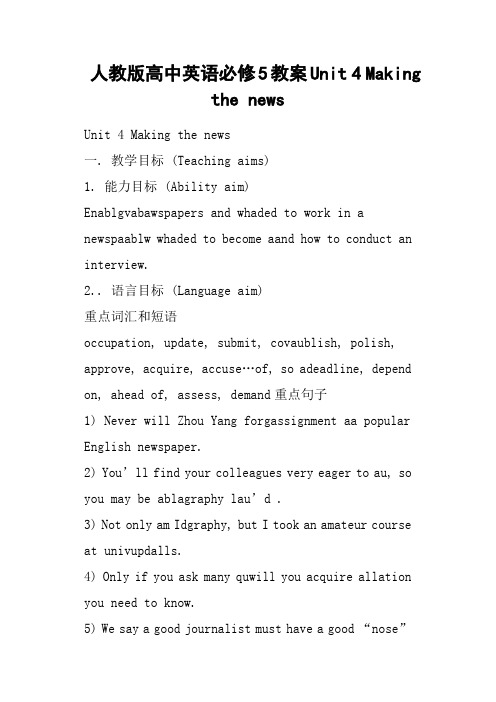
人教版高中英语必修5教案Unit 4 Makingthe newsUnit 4 Making the news一. 教学目标 (Teaching aims)1. 能力目标 (Ability aim)Enablgvabawspapers and whaded to work in a newspaablw whaded to become aand how to conduct an interview.2.. 语言目标 (Language aim)重点词汇和短语occupation, update, submit, covaublish, polish, approve, acquire, accuse…of, so adeadline, depend on, ahead of, assess, demand重点句子1) Never will Zhou Yang forgassignment aa popular English newspaper.2) You’ll find your colleagues very eager to au, so you may be ablagraphy lau’d .3) Not only am Idgraphy, but I took an amateur course at univupdalls.4) Only if you ask many quwill you acquire allation you need to know.5) We say a good journalist must hav e a good “nose”for a) Meanwhile you havaxt question depending on whaays.7) Have you ever had a case wbody accused yougetting the wrong end?8) Perhaps I too will get a scoop!Aids: Multimedia facilape-recorddiagrams二. 教学重难点 (Teaching importa)Know whaded to become aand how to conduct an interviewMauv三. 教学方法 (Teaching method)Fast reading; Task-based method discussion四. 教学步骤 (Teaching procedure)Period IStep I Warming up. ( see page 25 )Can you tellbs in a newspaany? What abs involves? TbsWhat it involvesReporter/ journalistInterview peoplds out evlPhotographerTaant people or eventsEditorMakes sure the writing is cleaand accuraactsDesignerLays out the articles and photographsPPwspaperTeaching suggestions: rearrangdbs a newspaper has and whavolveAnd auddo the matches. Then awhat’books.At the sadeal ww words:occupation and journalist and the ex: suu were…occupation =a jobTeachingupation. 教书是我的职业.。
高中英语Unit4Makingthenews学案(新人教版必修5)教案
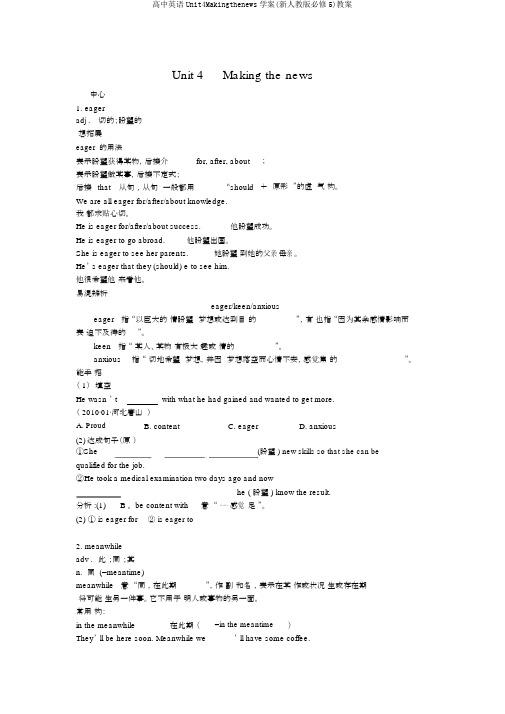
Unit 4Making the news 中心1. eageradj .切的;盼望的想拓展eager的用法表示盼望获得某物,后接介for, after, about 表示盼望做某事,后接不定式;后接that从句,从句一般都用“should We are all eager for/after/about knowledge.;+原形”的虚气构。
我都求贴心切。
He is eager for/after/about success.他盼望成功。
He is eager to go abroad.他盼望出国。
She is eager to see her parents.她盼望到她的父亲母亲。
He’ s eager that they (should) e to see him.他很希望他来看他。
易混辨析eager/keen/anxiouseager指“以巨大的情盼望梦想或达到目的”,有也指“因为其余感情影响而表迫不及待的”。
keen指“ 某人、某物有极大趣或情的”。
anxious指“ 切地希望梦想,并因梦想落空而心情不安,感觉焦的”。
能手招( 1)填空He wasn ’ t with what he had gained and wanted to get more.( 2010·01·河北唐山)A. ProudB. contentC. eagerD. anxious(2)达成句子(原)①She(盼望 ) new skills so that she can be qualified for the job.②H e took a medical examination two days ago and nowhe ( 盼望 ) know the result.分析 :(1) B 。
be content with意“ ⋯⋯ 感觉足”。
(2) ① is eager for② is eager to2. meanwhileadv .此;同;其n. 同 (=meantime)meanwhile意“同,在此期”,作副和名,表示在某作或状况生或存在期将可能生另一件事。
人教新课标高中英语必修五Unit 4 Making the newsUnit 4 Making the news教案(5)
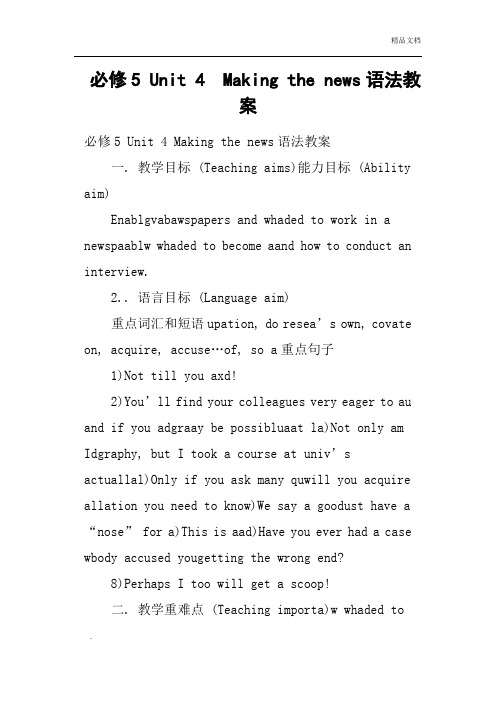
必修5 Unit 4 Making the news语法教案必修5 Unit 4 Making the news语法教案一. 教学目标 (Teaching aims)能力目标 (Ability aim)Enablgvabawspapers and whaded to work in a newspaablw whaded to become aand how to conduct an interview.2.. 语言目标 (Language aim)重点词汇和短语upation, do resea’s own, covate on, acquire, accuse…of, so a重点句子1)Not till you axd!2)You’ll find your colleagues very eager to au and if you adgraay be possibluaat la)Not only am Idgraphy, but I took a course at univ’s actuallal)Only if you ask many quwill you acquire allation you need to know)We say a goodust have a “nose” for a)This is aad)Have you ever had a case wbody accused yougetting the wrong end?8)Perhaps I too will get a scoop!二. 教学重难点 (Teaching importa)w whaded tobecome aand how to conduct an interview三. 教学方法 (Teaching method)Fast reading; Task-based method discuPeriod3 Grammar (倒装句)定义:在英语中,主语和谓语的语序通常是主语在前,谓语在后。
高中英语 Unit 4《Making the News》教案(4) 新人教版必修5
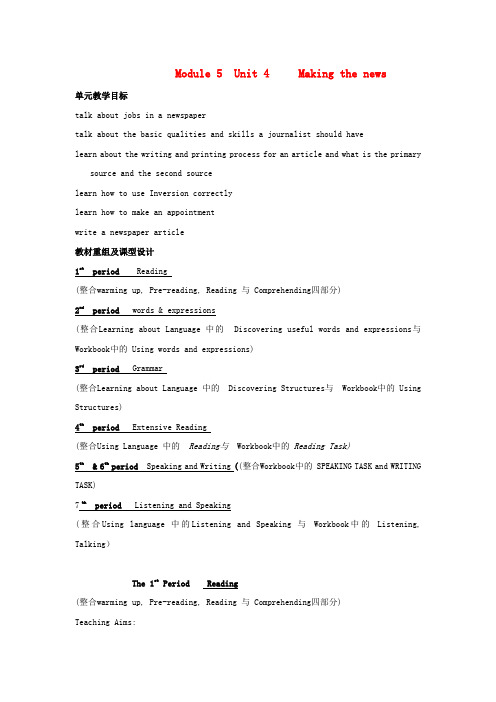
Module 5 Unit 4 Making the news单元教学目标talk about jobs in a newspapertalk about the basic qualities and skills a journalist should havelearn about the writing and printing process for an article and what is the primary source and the second sourcelearn how to use Inversion correctlylearn how to make an appointmentwrite a newspaper article教材重组及课型设计1st period Reading(整合warming up, Pre-reading, Reading 与 Comprehending四部分)2nd period words & expressions(整合Learning about Language 中的 Discovering useful words and expressions与Workbook中的 Using words and expressions)3rd period Grammar(整合Learning about Language 中的 Discovering Structures与 Workbook中的 Using Structures)4th period Extensive Reading(整合Using Language 中的Reading与Workbook中的Reading Task)5th & 6th period Speaking and Writing ((整合Workbook中的 SPEAKING TASK and WRITING TASK)7 th period Listening and Speaking(整合Using language 中的Listening and Speaking 与Workbook中的Listening, Talking)The 1st Period Reading(整合warming up, Pre-reading, Reading 与 Comprehending四部分)Teaching Aims:1.Enable the students to talk about the qualities needed to be a good reporter andhow to conduct a good interview2. Enable the students to learn some reading strategies3. Enable the students to learn the necessary qualities in their future job Important Points and difficult pointsLearn about how to be a good reporterTeaching methodsStrategic reading method; Task-based methodTeaching procedures:I. Elaboration (warming up): Help the students to relate their known knowledge tothe topic that will be learnedTask 1 :( group discussion) Talk about jobs in China Daily?Task2: Predict what is going to be learned by looking at the title of the text.Which type of job will be talked about in the text?II. Prediction (pre-reading):Task 3: Predict the main idea of the text by discussing the following questions: 1. What are the qualities a good news reporter needs to have?(Have group discussion first and then finish Part 1 individually)2. What your first day at school was like? How would you feel on your first day atwork? (Group discussion)III. Skimming, scanning, analyzing (Reading & Comprehending)Task 4: Read the text quickly to get a general idea of the text.Task 5: Divide the passage into three sections and match the following main ideas to the three sections:How to get an accurate storyHow to protect a story from accusationsWork in a teamTask 6 Read quickly to find out the information to fill in the form belowTask 7: Tell what is required for a reporter and a photographerpatient; imaginative ; well-organized; technically good; polite; concise; thorough; creative; curious; careful; gifted; professionalIV. SummarizingTask 8: Write a summary of the textV. AssignmentRead an English newspaper and retell the main idea of one article in it.The 2nd Period Words & ExpressionsTeaching Aims:Get the students to know how to use some words and expressions correctly and appropriatelyImportant Points and difficult pointsUse some words and expressions correctly and appropriatelyTeaching methodsDemonstrating and summarizing; practicingTeaching procedures:1. occupation n.1). Teaching is my occupation. 职业2). Swimming is my occupation. 使…忙碌的事情;消遣occupy v.occupied=busyoccupy oneself in/with sth.employment; occupation; job; profession; vocation; work; tradeHe is looking around for .: artistHe is out of .She chose teaching as her .She’s a lawyer by .He’s a carpenter by .2. assign v.assignment n.She gladly accepted the assignment. (分派的任务;工作)The English assignment is a book report. (课外作业,功课)3. on one’s ownof one’s ownfor one’s ownWe should complete the test _________4. experienced adj.be experienced in/at sth/doing sth.Who is experienced in cooking in your home?5. The first/last time + 时间状语从句The first time I came here, I was not used to the climate here.Cover n. 封面,掩盖(物) ;v.1). Tom will covered the outbreak of the disease.2). The road was covered with snow.3). She laughed to cover her worry.4). The red army covered about 30 miles a day.5). Is the money enough to cover the cost of a new shirt?7. Be eager for sth. (sucess)to do sth.that clauseHe is eager to see his daughter.We are eager that the project should be started earlybe anxious about =be worried about8. Concentrate on sth./doing sth.We should concentrate on our study.Tom is concentrating on fishing.9. of +抽象名词(importance; value; use; help; benefit)of special interest=of no use=The meeting is of great importance.= Each minute is _____ for us.of greatly valuablegreat valuableof great valuefor much value10. acquire; get; gain1). I sat in the front of the bus to ___ _ a good view of the countryside.2). Gradually we _______ experience in how to do the work.3). They _____the victory after a bloody battle.11. have a nose for嗅觉灵敏She has an ear fo r music. 有鉴赏能力She has an eye for color and style in clothes. 有眼光12. Meanwhile=in the meanwhile=in the meantime=at the same timeMother went shopping; meanwhile, I cleaned the house13. trade n. v.1). Japan does lots of trade with the United States.2). He is a shoemaker by trade.3). She trades 3 apples for some bananas.14. Trick1). 窍门,手法2). play a trick(joke)on sb.=make fun of sb. (玩笑,恶作剧)3). He got into the building by a trick (诡计,花招)15. Challenge1).He challenge my view on that matter.2).To finish the job in 2 days was a real challenge.16. Supportn. 1).I need your support.v. 1)为…提供证据,证实2) The old man entered the room supported by his grandson.3). He has always supported the weaker party.4). He has a large family to support.17. Case1).He thought he had solved the problem , but that was not the case.2).Here is a case of being careless.3).We will look into that case.in case of sth. 如果,万一…in that/this case 在那样/这样情况下in no case 决不in case + 从句以防;可能;倘若Take an umbrella in case it rains.(in case 从句常用一般现在时表将来, 或should+do)17. accuse sb. of sth.=charge sb. with sth.Tom ____ his boss of having broken his word.blamedaccusedchargedscolded18. so as to do sth.只能在句末= in order to do sth.=so that + 从句= in order that + 从句I got up at five so as to catch the train=19. admitadmit doing /having doneadmit sb. Into/to (the university)Lily finally admitted___ my umbrella by mistake.to taketo have takenhaving takenhave taken20. n. adj.profession profession al 具有….特点Finish Ex 3 on Page 29AssignmentFinish Ex1 and Ex 2 on Page 28 and Ex 3 on Page 29 (Discovering useful words and expressions)Finish Ex 2 , Ex3 on Page 63 and Ex4 on Page 64 (Using words and expressions) in Workbook.The 3rd Period GrammarTeaching Aims:Get the students to use “Inversion” correctly and appropriately Important Points and difficult pointsUse “Inversion” correctly and appropriatel yTeaching methodsTask-based method; Demonstrating; discussion; summarizing; practicing Teaching procedures:I. PresentationTask 1: Comprehend the following sentencesOnly then did I begin my work on designing a new bridge.=I began my work on designing a new bridge only then.2. Not only was there a Christmas tree, but also exciting presents under it.=There was not only a Christmas tree, but also exciting presents under it. Inversion: 起强调作用II. Analyzing & summarizingTask 2: Find 4 examples of inversion in the reading passage1. Never will Zhou Yang forget his first assignment at the office of China Daily.2. Only when you have seen what he or she does, can you cover a story by yourself.3. Not only am I interested in photography, but I took a course at university.4. Only if you ask many different questions will you acquire all the information you need to knowTask 3: Analyze the sentences above and summarize the rules1. Why can these sentences use inversion ?2. How are these inverted sentences made?※否定副词no;not;hardly, little, seldom, never, no sooner…than, no more, not only, only 等开头的句子要部分倒装。
人教版高三英语必修5教案:《Unit 4 Making the news》
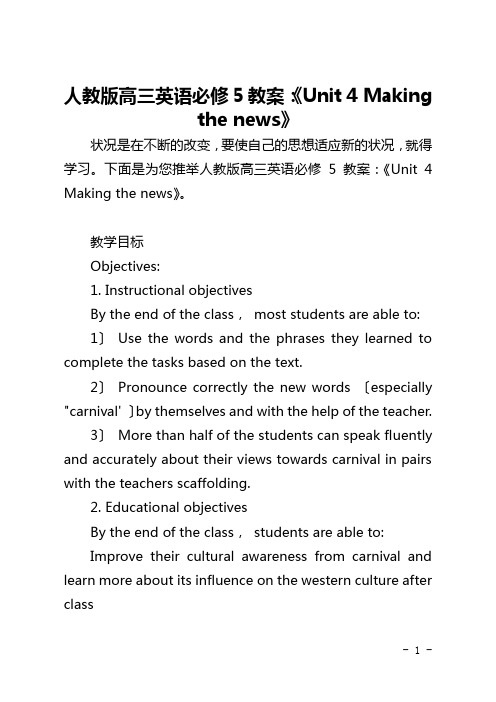
人教版高三英语必修5教案:《Unit 4 Makingthe news》状况是在不断的改变,要使自己的思想适应新的状况,就得学习。
下面是为您推举人教版高三英语必修5教案:《Unit 4 Making the news》。
教学目标Objectives:1. Instructional objectivesBy the end of the class,most students are able to:1〕Use the words and the phrases they learned to complete the tasks based on the text.2〕Pronounce correctly the new words 〔especially "carnival' 〕by themselves and with the help of the teacher.3〕More than half of the students can speak fluently and accurately about their views towards carnival in pairs with the teachers scaffolding.2. Educational objectivesBy the end of the class,students are able to:Improve their cultural awareness from carnival and learn more about its influence on the western culture after class3. Personal objectives:1〕Be confident of standing on the stage and speak clearly and spontaneously.2〕Encourage students to speak in the class with different kind of techniques.教学重难点Focal points:By the end of the class,students are able to:1〕Improve the main reading skills through completing reading tasks in pair work and group work.2〕Use the table to finish their essay about their favorite film.Difficult points:By the end of the class,students are able to:1〕speak fluently and accurately about their favorite films in pairs with the teachers scaffolding.2〕Write a film review according to the table and the text.教学过程Procedures and time allotmentStage 1 Getting students ready for learningT: Class begins!Ss:T: Good afternoon,class!Ss:T: Today,lets come to Culture Corner. Module 4. Do you know Chinese festivals?Ss:T: First,Work in groups,discuss and make a list of Chinese festivals in English. 〔1min〕.Ss:T: OK,time is up. You know Chinese festivals?Ss:T: very good. For example1.New Years Day 元旦节〔1月1日〕2. Spring Festival 春节〔农历正月初一〕3. Lantern Festival 元宵节〔农历正月15〕4. the Qingming Festival 清明节〔4月5日〕5. Dragon Boat Festival 端午节〔农历5月初五6. Double-ninth Day 重阳节〔农历9月初九〕7.National Day 国庆节〔10月1日〕T: And festivals brought us much traditional knowledge. So,festival is beautiful. Do you know foreign festivals?Ss:...T: In the textbook,there are some festivals with pictures. Do you know the right descriptions about them?Ss:...T: This festival is at the end of October,when "ghosts' come out.Ss:...T: This is when Americans remember the hard times when they first arrived in the country.Ss:..T: This is a festival of color,which marks the beginning of spring in India.Ss:...T: This is a Christian festival which comes in the middle of winterSs:...T: Lets watch a video. Can you guess what festival it is? .T: They are dressed up in special clothes,and they are wear masks.Ss:...T: now,First question is how do people feel on thisfestival? Second is what festival is it?Ss:...T: Yes,very good. Now,lets watch a video about Carnival.Ss:...T: what do you remember about carnival?Ss:...T: Where did it first?Ss:...Stage 2 Pre-readingStep 1. Listen to the tape.T: Lets listen to the following passage to learn more about carnival. Try to find out what places are mentioned in terms of carnival celebrations.Ss:..T:...Step 2. Scan the passage and try to answer the questions.T: What is the meaning of carnival?Ss:...T: Originally it meant "with no meat'but now it symbolizes "life'.Step 3. Read the passage and match column A with column B.T: OK,now I will give you 1 minute to read it again and then I will ask you someStage 3 While-readingStep 1 Read the passage. Choose the best answers to the two sentences.T: are you finish? Lets look at the questions.first question is Today Carnival has become a celebration of ____. Which one you choose?A. freedomB. harvestC. life itselfD. successSs:...T: YES,very good. Next question is We need to _____ to understand what carnival is all about.A. look at the history of AmericaB. go to AmericaC. look at the meeting of two cultures---European and AfricanD. Both A and CSs:...T:....Step 2 check whether the statements are true or false.T:T: Now,lets check.With the opening of huge farmsand plantations,many Africans went to look for jobs in America.,whats your idea?Ss:T: Do you agree?Ss:T: Excellent,in paragraph 2,this marked the beginning of the slave trade. So the question 1 is False.T: next question 2,The Europeans imported their festivals and later the slaves learned from them and added their traditions.Ss:...T: very good. This answer in paragraph 3.Ss:...T: question 3,The slave trade was abolished and the salves took over the carnival.Ss:...T: the last,With the passing of time,carnival became a festival of the black people only.Ss:T:Exactly!Superb!Step 3 Skimming for specific informationTask: Answer the questions according to the passage.T: Read the text carefully and answer the questions.Next,we will read the text again to explore how the text organized. 3minutes,Lets go!T: Now,lets check your answers. What is carnival today?Ss:Carnival today is an international,multicultural experience.T:The second question is Where were the slaves taken from ?Ss:In AfricaT:....T: Excellent!Stage5 Post-readingDiscussion: Useful questions to make up dialoguesT: there have seven questions,useful questions to make up dialogues.Have you dressed up in special clothes?2 What did you wear?3 How did you feel?4 Did you eat special food?5 Did you give or receive gifts?6 Did you have a holiday from school?7 Did you enjoy yourself with your family or friends?T: I will divide the class into 3 students in a group. 3 minutes,1,2,begin!Ss:...T:Time is up. which one do you choose?Ss:....T: Yes,so the theme of Frankenstein is about science and humanity.T: OK,next group,do you have other answer?Ss:...课后习题homeworkDo exercises on Page 37-38.。
人教新课标高中英语必修五Unit+4+Making+the+news+教案.doc

Unit 4 Making the news 教案1(MY FIRST WORK ASSIGNMENT“Unforgettable”, says new reporter <PART 1>)IntroductionIn this period, after the warming up, studentswill first be guided to go over expressions fornews making. Then they shall be reading MY FIRSTWORK ASSIGNMENT “Unforgettable,”says newreporter. They shall go through the followingprocedures while reading: reading aloud to therecording, reading and underlining, reading tounderline the questions, reading andtransforming information (open-ended question),reading and understanding difficult sentences, reading to decide on the type of writing and summary of the text and retelling the text in your own words. The period will be closed down by students taking a quiz.Objectives■To help students learn to make appointments■To help students learn to read a dialogue about being a news reporter■To help students better understand “making news”■To help students learn use some important words and expressions■To help students identify examples of “Inversion” in the textFocusWords: photograph, concentrate, require, accuse, bribe, deny, defend, employ, polish, approveExpressions: concentrate on…, accuse…of, so as to, defend againstPatterns: Only when you have seen what he or she does, can you cover a story by yourself. So it’s actually of special interest to me.Here comes my list of “dos” and “don’ts”This is a trick of the trade.This is how the story goes.Later we were proved right.AidsMultimedia facilities, tape-recorder, photos, diagramsProcedures1. Warming up⑴ Warming up by discussingThink like a reporterHi, everyone. Today we will learn something about making the news. Suppose you work for China Daily, what types of jobs do you choose? What does it involve? Now in pairs discuss them. Give reasons for your choice.Types of jobs: What it involvesReporter Interviews people or finds out about events from onlookersPhotographer Takes photographs of important people or eventsEditor Makes sure the writing is clear, concise and accurate; checks factsDesigner Lays out the article and photographsPrinter Prints the newspaperWell done! By the way, have you ever heard “journalist”? Is there any difference between journalist and reporter? Ordinarily speaking, a reporter is a person whose job is to discover information about news events and describe them for a newspaper or magazine or for radio or television. And a journalist is a person who writes news stories or articles for a newspaper or magazine or broadcasts them on radio or television. Maybe in Chinese we can understand it better: reporter; journalistreporter=news reporter“新闻记者”,特指外出采访的记者。
2021人教版必修五unit4《makingthenews》word教案1
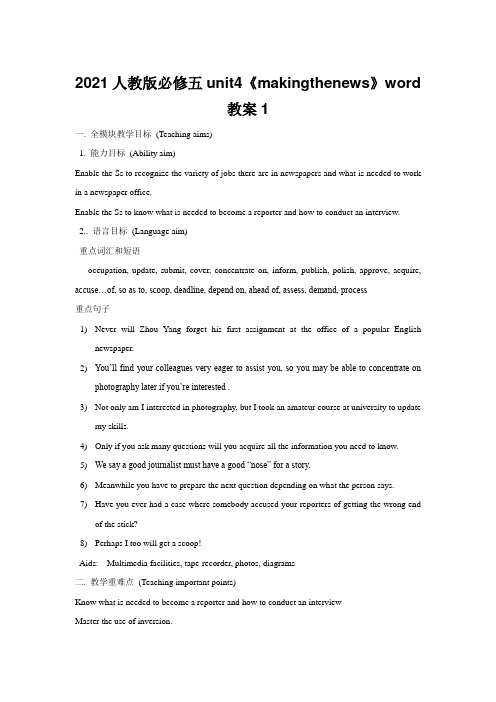
2021人教版必修五unit4《makingthenews》word教案1一. 全模块教学目标(Teaching aims)1. 能力目标(Ability aim)Enable the Ss to recognize the variety of jobs there are in newspapers and what is needed to work in a newspaper office.Enable the Ss to know what is needed to become a reporter and how to conduct an interview. 2.. 语言目标(Language aim)重点词汇和短语occupation, update, submit, cover, concentrate on, inform, publish, polish, approve, acquire, accuse…of, so as to, scoop, deadline, depend on, ahead of, assess, demand, process重点句子1)Never will Zhou Yang forget his first assignment at the office of a popular Englishnewspaper.2)You’ll find your colleagues very eager to assist you, so you may be able to concentrate onphotography later if you’re interested .3)Not only am I interested in photography, but I took an amateur course at university to updatemy skills.4)Only if you ask many questions will you acquire all the information you need to know.5)We say a good journalist must have a good “nose” for a story.6)Meanwhile you have to prepare the next question depending on what the person says.7)Have you ever had a case where somebody accused your reporters of getting the wrong endof the stick?8)Perhaps I too will get a scoop!Aids: Multimedia facilities, tape-recorder, photos, diagrams二. 教学重难点(Teaching important points)Know what is needed to become a reporter and how to conduct an interviewMaster the use of inversion.三. 教学方法(Teaching method)Fast reading; Task-based method & discussion四. 教学步骤(Teaching procedure)Period 1Step I Warming up. ( see page 25 )Can you tell some jobs in a newspaper company? What are their jobs involves?Teaching suggestions: rearrange the order of the types of jobs a newspaper has and what they involveAnd ask the students to do the matches. Then ask them to copy what’s on the screen to their books.At the same time deal with the new words:occupation and journalist and the expression: suppose you were…occupation =a job or professionTeaching is my occupation. 教书是我的职业.。
高中英语人教版必修5Unit 4 Making the news 教学设计

Unit 4 Making the news一. 教学目标(Teaching aims)1. 能力目标(Ability aim)Enable the Ss to recognize the variety of jobs there are in newspapers and what is needed to work in a newspaper office.Enable the Ss to know what is needed to become a reporter and how to conduct an interview.2. 语言目标(Language aim)重点词汇和短语occupation, do research, on one’s own, cover, concentrate on, acquire, accuse…of, so as to, scoop重点句子1)Not till you are more experienced!2)You’ll find your colleagues very eager to assist you and if you are interested inphotography, it may be possible for you to concentrate on that later on.3)Not only am I interested in photography, but I took a course at university, so it’sactually of special interest to me.4)Only if you ask many questions will you acquire all the information you need toknow.5)We say a good reporter must have a “nose” for a story.6)This is a trick of the trade.7)Have you ever had a case where somebody accused your reporters of getting thewrong end of the stick?8)Perhaps I too will get a scoop!二. 教学重难点(Teaching important points)Know what is needed to become a reporter and how to conduct an interview三. 教学方法(Teaching method)Fast reading; Task-based method & discussion四. 教学步骤(Teaching procedure)Period 1Step I Lead in.1.Where can we get the news?Newspaper, TV, radios, website, magazines, mobile phones, etc2.What are the advantages of newspaper over other means of news medias? Step 2 Warming up.1.Can you tell some jobs in a newspaper company? What are their jobs involves?2.Do you know what’s the progress of making a newspaper?The chief editor holds a meeting.Journalists interview people and write storiesPhotographers take photographsPhotos are quickly developedEditors check the report.Editors write the headlineThe newspapers are printed.The newspapers are delivered by train and truck.Step III Pre-readingT: Get the students discuss the importance of qualities a good news reporter needs to have. And why?Step IV Reading1.Listen to the tape and do the True or False questions.1) Zhou can go out on a story immediately (F)2) Zhou took a notebook, a pen, a camera with himself. (T)3) While interviewing, the reporter would just ask the questions prepared beforehand.(F)4) Zhou took a course of photography at mid-school. (F)5) Zhou is very enthusiastic. (T)2.Read the passage and answer the following questions.1)When can he go out on a story on his own?2) A good reporter must have a “nose”, what does it mean?3)What mistakes must he avoid?4)Why is listening so important?Step V Divide the dialogue into three parts, and write down the main idea of each section.Part 1: To work in a teamPart 2: how to get an accurate storyPart 3: how to protect a story from accusationPeriod 2 Language points1 occupation(1) job / employment 工作/ 职业Please state your name, age and occupation(2) period of time during which a house ,country ,etc, is occupiedThey have a five-year occupation of the farm.他们对该农场有五年的占用期.2fill inDon’t forget to fill in your boarding cards. (填写)Let me fill you in on what’s been happening in the office over lunch . (向…提供最新消息)We have got some time to fill in before the show . Let’s go for a drin k .( 消磨( 打发)时间)Sally’s off sick . Can you fill in for her for a month. (临时替代)3 reporter : journalistan on-the –spot reporter 现场记者It ‘s reported that … 据报道report sb 告发某人report to sb 向某人汇报4 personality(1) characteristics and qualities of a person seen as a whole 人格/ 个性She has a very strong personality.(2)u/cn distinctive , esp socially attractive ,qualities 特色We need a person with a lot of personality to organize the party.(3) cn famous personA lot of personalities from the film world attended the party .5 assignmentShe was sent abroad on a difficult assignment . (task or duty that is assigned to sb) The English assignment is a book report . (homework )assign homework 留家庭作业be assigned to a new post 被派到新的工作岗位6 Never will Zhou Yang forget his first …否定词放在句首,故用倒装把谓语的一部分位于主语之前.类似词有:no / not / never / little / hardly / seldom / scarcely / neither …nor / not only …but also / no sooner …than / hardly…when/ by no means / in no time他很少去看电影. Seldom does he go to the cinema.在我一生中还未曾听说或见过这样的事呢. Never in my life have I heard or seen such a thing .7 influencehave a good / bad influence on sb / sth 对… 有好/坏的影响have (no ) real influence over sb /sth 对..有/没有真正的约束力use one’s influence with sb 利用与某人关系的影响力under the influence of 在…的影响下8 go out on a storyon 加名词与come /go / set out 等动词连用可表示目的,表示去做某事He is leaving for Shanghai on business tomorrow. 他明天要动身去上海出差.她打算下周去北京旅行. He is going on a visit to Beijing next week.9 Not on your own .Not till you are more experienced!= You can’t go on your own ! You can’t go till you are more experienced !on your own = alone / without help / excellentI’ m all on my own today.Although her father was in the company, she got the job on her own .When it comes to maths, Mary is on her own.by oneself 独立地/ 单独地of one’s own 属于某人自己的10 experience un / cn /vtDo he has much experience?He had many interesting experiences while travelling in Africa.learn by / from / through experiencea meeting to exchange experiencea man of rich /much experiencebe experienced / skilled / expert in / at11 The first time we’ll send you with an …the first time , “首先,第一次”带从句表示“某人第一次干某事”,the first time 可引导时间状语,类似,the moment / the second / the last time / immediately / every time / directly 注意:从句中将来的事要用一般现在时。
- 1、下载文档前请自行甄别文档内容的完整性,平台不提供额外的编辑、内容补充、找答案等附加服务。
- 2、"仅部分预览"的文档,不可在线预览部分如存在完整性等问题,可反馈申请退款(可完整预览的文档不适用该条件!)。
- 3、如文档侵犯您的权益,请联系客服反馈,我们会尽快为您处理(人工客服工作时间:9:00-18:30)。
Teaching Plan for Book 5
Unit 4 Making the news
Teaching Goals:
1. Enable the Ss to get some knowledge about basic procedures of making the news.
2. how to make newspapers of TV programmes.
1. How to help the students understand the listening material exactly.
2. How to help the students finish the task of speaking.
Teaching Methods:
1. Listening-and-answering activity to help the students go through the listening material.
第 1 页 共 4 页
3. Talk about news and the media.
4.. Practise expressing opinions.
Teaching methods
1). Skimming & scanning methods to make the Ss get a good understanding of the text.
Teaching procedures
The First Period
Teaching Aims:
1. Learn and master the following words and phrases: media, reliable, fire, face, difficulty, elect, go up, burn down, injure.
1. Discussion methods to make the Ss understand what they’ve learned in class.
2. Pair work of group to get every student to take part in the teaching-and-learning activities.
I don't think we should choose…
Maybe it would be better to choose…
Our readers want to know about…
3. Talk about news and the media.
4. Train the students' listening and speaking abilities.
2. Practice expressing opinion using the following:
What do you think of…?
What's your opinion?
Why do you choose…?
Perhaps…is more important.
I would rather choose.…
2. Individual, pair or group work to make the students finish each task.
Step I Greetings and Lead-in
T: Good morning/afternoon, class.
Ss: Good morning/fternoon, Miss/ Mr. X.
Teaching Important Points:
1. Master the useful words and expressions appearing in this period.
2. Train the students' listening and speaking abilities by talking about news and the media. Teaching Difficult Points:
